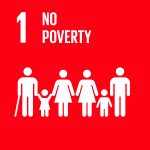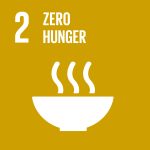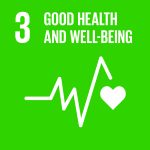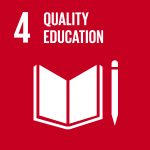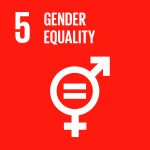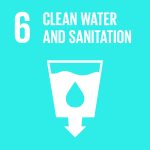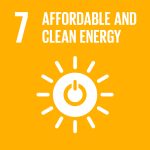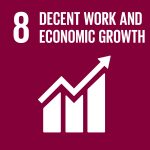ODSesiones
Description
Institution
Organizations/areas of the university involved
The main organiser is the Vice-Rector for Transparency and Social Responsibility and his Department. Additionally, being a core project for the University of Murcia (UMU), all the Schools and Faculties as well as some of the university’s administration services (the Volunteering Service, Technical Support Unit, the Student Council…) are involved in the project.
Country
Spain
The aim of the project ODSesiones (a play on words using “ODS”, the equivalent for the initials “SDG” in Spanish, and the translation of the word “obsession”) is two-fold: to increase awareness of the SDGs among members of the University of Murcia and to carry out activities that have a real impact on Murcia citizens. From February 2019 to February 2022, the UMU will deal with and promote the 17 SDGs, one per month. The SDG framework has been used because of the UMU strong belief that it is its duty to educate students in the values represented by the SDGs and to encourage them to take action in their pursuit.The first step was to meet the Deans of all the Faculties and Schools of the UMU, so they could choose which SDGs they would participate on, based on their areas of expertise and the problems addressed by the SDGs. Another meeting took place with more than fifty NGOs and associations, which also chose the SDGs more closely related to their courses of action.The basis for each SDG-related program is set in a preparatory meeting where all the participants propose activities that, afterwards, are integrated in the month schedule. Along the month, around 50-60 activities related to the focused SDG are developed: lectures, workshops, art exhibitions, field trips, volunteering programs, fairs… These will take place all over the University (sometimes in city center), but mainly in the hosting Schools. Many activities are directly suggested by the students to ensure the project meets their expectations and preferences. By the end of each month, the so-called 2030 Classroom is held. Run by an expert on the field, a group of professors from the hosting School discusses the way the corresponding SDG could be implemented into their degrees.To gain visibility, a communication campaign has been designed. Thus, in the online environment, a website as well as profiles in social networking sites have been created whereas, in the offline context, “ODSesiones” tents and benches are displayed all over the university campuses. Student volunteers provide information about the project in strategic spots.
Results and impact measured or expected
Our main goal is to make every person in the UMU aware of the SDGs and to provide them with tools to work for their achievement.
The most objective way of assessing our success is by tracking the number of participants attending the different activities. During the eight months of ODSesiones, 246 activities related to SDGs have been organized, with 13,612 participants in total.
136 students of the University of Murcia have volunteered in ODSesiones to help with the development of the activities. The project’s social networks (Facebook, Twitter and Instagram) have around 12,500 followers in total.
But the greatest figure to show the impact of ODSesiones is the number of NGOs, companies, organizations, public administration entities and other institutions that have been involved in the project: 225 by now. Another success indicator in the future will be the subjects that have implemented SDGs-related topics in the learning process.
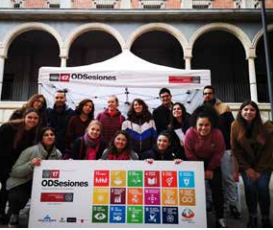
Connection with the SDG framework
By now, SDGs 1 to 8 have been already on the spot through ODSesiones, here are some examples of the activities that were developed:
SDG1 (Economics and Social Work Faculties): a visit to a shelter for the homeless.
SDG2 (Biology and Veterinary Faculties): a cooking class in which recipes that prevent food waste were taught and practiced.
SDG3 (Health-related Faculties): free eye screenings and blood pressure monitoring at the University.
SDG4 (Education and Psychology Faculties): workshops on inclusive actions for children with disabilities in the classroom.
SDG5 (Communication, Labour Sciences and Law Faculties): public recognition to 100 relevant women of Murcia.
SDG6 (Biology and Chemistry Faculties): collection of cigarette butts all over the city to prevent them from getting into the sewage.
SDG7 (Chemistry, Computer Science and Mathematics Faculties): an exhibition of green vehicles.
SDG 8 (Labour Science Faculty): a conference given by the ILO President (Spanish branch).
Barriers and follow up
Initially, the main barrier was related to students’ participation but, as they have become familiar with the project, their interest has grown steadily. Moreover, the professors’ involvement was also required. Thus, attendance needed to be facilitated by linking and/or replacing their lessons by the “ODSesiones” activities. This way, the project initiatives are perceived as an alternative teaching method instead of an interference with their course schedule. So from now on, before the start of a new SDG month, we meet with the Dean and his/her team to identify which activities are more related with the different courses so that professors can include them in their teaching plans.
Additionally, we try to gain students’ attention and involvement through ECTS credits, the “odsesionado/a” card (which enables them to win some sustainable prizes such as gym swimming pool and tram passes, BT-shirts, pins, bracelets, among others) and a contest on Instagram.
Education 4 SDG funciona gracias a WordPress
